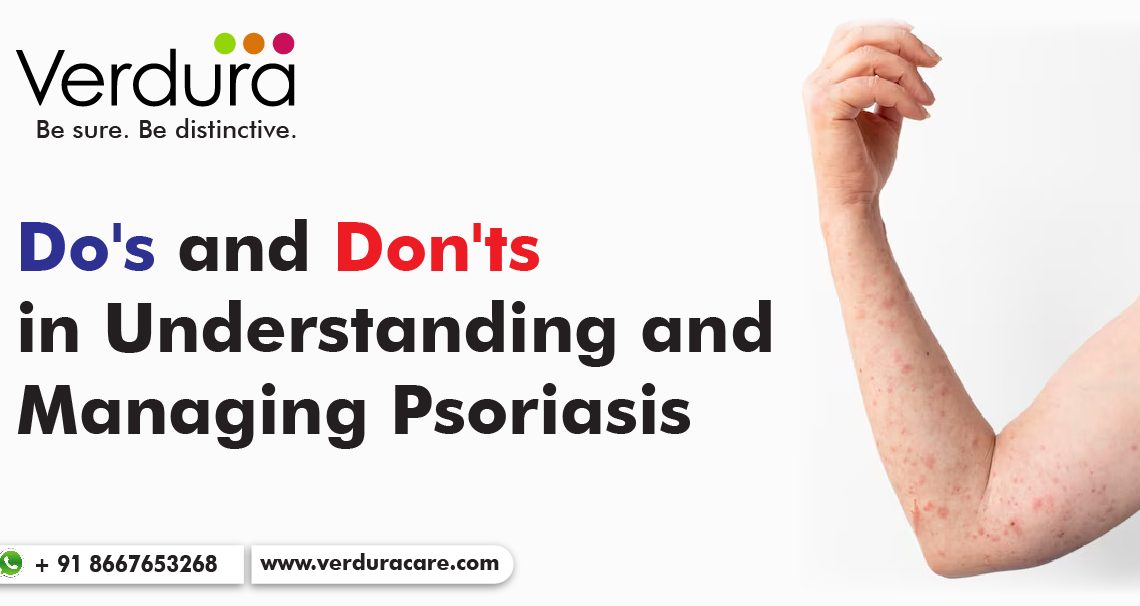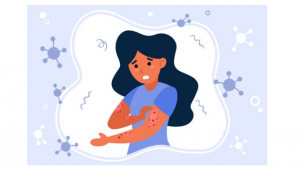Do’s and Don’ts in Understanding and Managing Psoriasis

Psoriasis is a chronic autoimmune disease that affects the skin, causing red, scaly patches that can be itchy and painful. We will explore the do’s and don’ts of managing psoriasis, covering everything from its causes and treatment options to dispelling common misconceptions. let’s dive in!

Understanding Psoriasis:
Psoriasis is not just a simple skin condition; it is a complex autoimmune disease. The exact cause is still unknown, but it is believed to be a combination of genetic factors, immune system dysfunction, and environmental triggers.
Psoriasis and Contagion
Contrary to popular belief, psoriasis is not contagious. It cannot be transmitted through touch or close contact. The condition is rooted in an overactive immune system, not bacteria or viruses. It’s important to educate others about this fact to dispel any misconceptions or stigmatization.
The Itch Factor:
One of the most common symptoms of psoriasis is itching. The severity can vary from person to person, and it can significantly impact daily life. Avoid scratching the affected areas as it can worsen the condition and lead to secondary infections. Instead, opt for gentle tapping or moisturizing the area with suitable products. Psoriasis can be itchy and finding the right lotion or cream can provide relief.

Psoriasis and Eczema:
It is possible to have both eczema and psoriasis simultaneously. While they are separate conditions, they share some similarities, such as dry and itchy skin. If you have both, it is crucial to work with a dermatologist to develop a tailored treatment plan that addresses the specific needs of each condition.

Treatment Options:
Although there is currently no known cure for psoriasis, there are numerous treatment options available to manage its symptoms effectively. The best treatment for you may vary based on the severity of your psoriasis, medical history and personal preferences which may include topical creams, oral medications, phototherapy or biologic treatments.
Topical Care:
Finding the best lotion for psoriasis is crucial when managing the condition. Look for moisturizers and lotions specifically formulated for sensitive and dry skin.
Ingredients like salicylic acid, coal tar, or corticosteroids may be beneficial in reducing inflammation and scaling. It’s essential to consult with a healthcare professional or dermatologist to determine the best options for your unique needs.

Lifestyle Do’s and Don’ts
-☑️ Do maintain a healthy lifestyle: Regular exercise, a balanced diet and stress management can help reduce flare-ups and improve overall well-being.
– ❌ Don’t smoke: Smoking has been linked to more severe cases of psoriasis and can decrease the effectiveness of treatments.
– ☑️ Do protect your skin: Avoid prolonged exposure to harsh weather conditions, use sunscreen and moisturize regularly to prevent dryness and irritation.
– ❌ Don’t skip medications: Consistency is key when it comes to managing psoriasis. Follow your prescribed treatment plan and communicate with your healthcare provider if any adjustments are necessary.
-☑️ Do seek emotional support: Psoriasis can have a significant impact on mental health. Join support groups, talk to loved ones, or consider therapy to cope with the emotional challenges it may bring.

Living with psoriasis can present challenges, but by understanding the condition and following the do’s and don’ts of management, individuals can lead fulfilling lives.
Remember, psoriasis is not contagious, and it is important to educate others about this fact to reduce stigmatization and misconceptions surrounding the condition. With proper management, a positive mindset, and a supportive network, individuals with psoriasis can lead fulfilling lives while effectively managing their symptoms.
Remember to seek the best psoriasis treatment for your unique needs, whether it involves topical creams, oral medications, phototherapy, or biologic treatments.
When it comes to topical care, finding the best lotion for psoriasis is essential. Look for products specifically designed to soothe and moisturize psoriasis-affected skin. Consulting with a healthcare professional or dermatologist can help identify suitable options that align with your unique needs and preferences.
In addition to all these DO’S and DON’T’S follow a proper routine to keep your skin free from scaling itching with this specially curated kit for psoriasis from Verduracare
Living with psoriasis requires patience and perseverance. While there is no known cure for psoriasis, advancements in research and treatment options provide hope for better management and improved quality of life. Stay informed, connect with a supportive community, and work closely with your healthcare team to navigate the journey of living with psoriasis.
Remember, psoriasis is a unique experience for each individual, and it may require some trial and error to find the most effective strategies for managing the condition. Be patient with yourself, seek professional guidance, and embrace a positive mindset. With the right approach, you can proactively manage your psoriasis and live a fulfilling life.